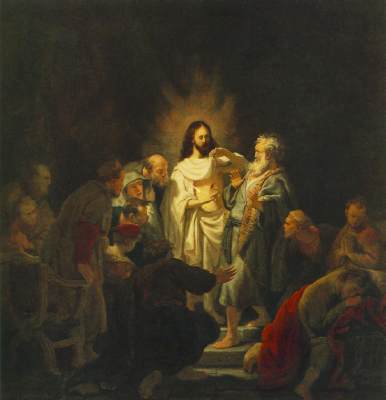The Second Sunday of Easter: John 20:19-31
Imagine being Thomas, coming home to brothers and sisters who are filled with awe and the tenuous beginnings of joy when you are still deep in the throes of horror and grief. “We have seen the Lord,” they say. Imagine how you would feel.
You might think, “What is this insanity? Are you idiots trying to avoid the harsh reality of a bloody, brutal ending with some nonsense about the Teacher appearing among you?” You might feel it to be a grave insult to your sense of profound loss. You might think it an attempt to diminish your rage at Judas, the Romans, and the religious authorities. You might feel it to be a travesty mocking your crushed dreams. It might make you burn with indignation and anger. Can’t a man even grieve?
But what you say is, “Pah! Unless I see the nail holes — no, unless I put my finger in those holes — he got being nailed up on a cross — unless I put my hand inside his side, where the spear cut him open — I don’t believe a word of what you’re telling me! And you shouldn’t either! What’s the matter with you people?!”
In a 2017 sermon delivered at Duke University, Barbara Brown Taylor invites us to focus on what Thomas is asking for. He does not want just to see the face of Christ, his beloved master. He is not looking for the characteristic smile or tone of voice or turn of phrase. He wants to see the evidence of the wounds. He wants to actually touch them, get inside them. He wants to know they are real.
For Christ to be Thomas’s Lord and God, he has to return bearing the signs of his torture and death. He can’t have somehow risen above the experience, sidestepped it through his divinity. It has to have left its deep marks on him. He has to have come through it, and it has to have changed him.
By expressing his skepticism, Thomas gives us all the invaluable gift of the knowledge of the true Christian scandal. It is simply this: Jesus Christ is God incarnate, which means he is God transformed by the experience of being human. God is forever changed, and changed beyond the bounds of time. The Master of the Universe is always going to have been born, to have lived, to have suffered and even to have died as a human being. We are siblings of the Cosmos, for the creator of the Cosmos has been one of us.
This is what it means to be the Messiah. “My Lord and my God,” Thomas exclaimed when Jesus let him put his hands in Jesus’ wounds. And he went away to carry the Good News to India and the East.
What is your response to meeting the risen Lord in the Upper Room of the Soul? Have you wrapped your mind around the fact of his wounds? Christ has conquered death through going all the way through it. What does that mean for each of us? What does it mean for you?

